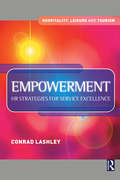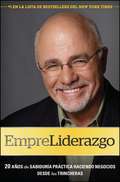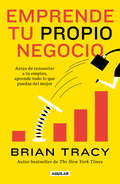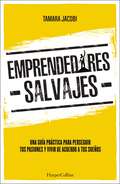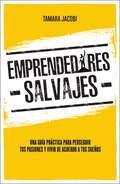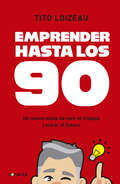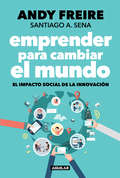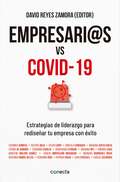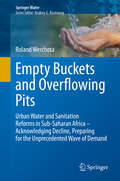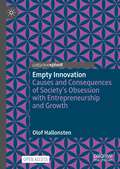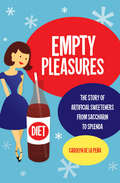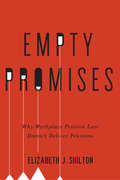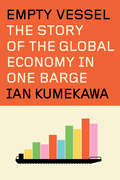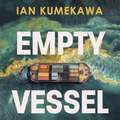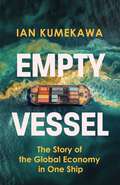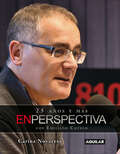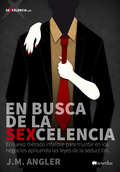- Table View
- List View
Empowerment: Hr Strategies For Service Excellence (Hospitality, Leisure And Tourism Ser.)
by Conrad Lashley'Empowerment: HR strategies for service excellence' shows managers and students the importance of empowerment as part of human resource strategy. It provides a critical perspective of this established vital management technique, identifying factors that will lead to a win: win situation for all concerned. When successfully incorporated as part of HR strategy, empowerment can:* enable organizations to gain commercial and competitive advantage* become more flexible* improve employee commitment* use the skills of individual employees to best advantage and enhance personal capabilities.'Empowerment: HR strategies for service excellence' uses case studies from companies such as McDonalds, TGI Fridays and Harvester Restaurants to build a picture of empowerment of service employees in context, illustrating how different forms of empowerment are employed and different working arrangements are practiced.
Empowerment: The Emperor's New Clothes
by Chris ArgyrisEveryone talks about empowerment, but it's not working. CEOs subtly undermine empowerment. Employees are often unprepared or unwilling to assume the new responsibilities it entails. Even change professionals stifle it. When empowerment is used as the ultimate criteria of success in organizations, it covers up many of the deeper problems that they must overcome. To understand this apparent contradiction, author Chris Argyris (Harvard Business School Professor Emeritus and Director at Monitor Co.) explores two kinds of commitment: external and internal. External commitment--or contractual compliance--is what employees display when they have little control over their destinies and are accustomed to working under the command-and-control model. Internal commitment occurs when employees are committed to a particular project, person, or program for their own individual reasons or motivations. Internal commitment is very closely allied with empowerment. The problem with change programs designed to encourage empowerment is that they actually end up creating more external than internal commitment. One reason is that these programs are rife with inner contradictions and send out mixed messages like "do your own thing--the way we tell you." The result is that employees feel little responsibility for the change program, and people throughout the organization feel less empowered. What can be done? Companies would do well to recognize potential inconsistencies in their change programs; to understand that empowerment has its limits; to establish working conditions that encourage employees' internal commitment; and to realize that morale and even empowerment are penultimate criteria in organizations. The ultimate goal is performance.
EmpreLiderazgo: 20 Años De Sabiduría Práctica Haciendo Negocios Desde Las Trincheras
by Dave RamseyA Simon & Schuster eBook trincheras a lo largo de más de veinte años y que le servirán para que lidere con confianza y seguridad.
Emprende tu propio negocio: Antes de renunciar a tu empleo, aprende todo lo que puedas del mejor
by Brian Tracy"Un camino directo hacia el éxito empresarial para principiantes... Los futuros emprendedores se beneficiarán de las estrategias sencillas de Brian Tracy." Kirkus Review En esta era empresarial es muy tentador dejar tu trabajo para empezar tu propio negocio. En Emprende tu propio negocio el mundialmente conocido autor bestseller y consultor de negocios Brian Tracy habla de una de las habilidades más necesarias hoy en día, el espíritu empresarial, abordando importantes temas como: -Los mitos de la iniciativa empresarial. -La mejor opción de negocio para ti. -Las opciones de financiamiento para tu negocio. -La estructura de un plan de negocios realista. -Las claves para construir el mejor equipo. -Las herramientas para crecer tu negocio con ventas y marketing. Este libro está diseñado para ayudar a cualquiera que quiera empezar o hacer crecer un negocio. Si aplicas las ideas de Brian Tracy, ¡tú también podrás convertirte en un emprendedor exitoso!
Emprendedores Salvajes
by Tamara JacobiTamara Jacobi comparte sus ideas sobre lo que se necesita para dar el salto con éxito.Ilustra cómo guías de surf, constructores de esquí, instructores de yoga y bienestar, activistas ambientales, amantes de la naturaleza, food trucks, podcasters, artesanos y otros creativos logran un estilo de vida aventurero y viabilidad financiera cuando se atreven a abrazar su espíritu libre y convertirse en empresarios salvajes!Jacobi comparte las lecciones que ha aprendido como empresaria, junto con las historias y la sabiduría de otros Emprendedores Salvajes, revelando las alegrías y las realidades de hacer realidad sus sueños comerciales.Esta guía salvaje, será una herramienta eficaz para iniciar y administrar un negocio no convencional. Una oportunidad para ir más allá del miedo, cobrar vida y sintonizarse con la inspiración mientras se gana la vida, y comienza a vivir la vida de sus sueños.Tamara Jacobi shares his ideas about what it takes to make the jump successfully.Illustrate how surf guides, ski builders, yoga and wellness instructors, environmental activists, nature lovers, food trucks, podcasters, artisans and other creatives achieve an adventurous lifestyle and financial viability when they dare to embrace their free spirit and become wild entrepreneurs!Jacobi shares the lessons she has learned as a businesswoman, along with the stories and wisdom of other Wildentrepreneurs, revealing the joys and realities of making her business dreams come true.This wild guide will be an effective tool to start and manage an unconventional business. An opportunity to go beyond fear, come alive and tune in to inspiration while making a living, and start living the life of your dreams.
Emprendedores Salvajes
by Thomas NelsonTamara Jacobi comparte sus ideas sobre lo que se necesita para dar el salto con éxito.Ilustra cómo guías de surf, constructores de esquí, instructores de yoga y bienestar, activistas ambientales, amantes de la naturaleza, food trucks, podcasters, artesanos y otros creativos logran un estilo de vida aventurero y viabilidad financiera cuando se atreven a abrazar su espíritu libre y convertirse en empresarios salvajes!Jacobi comparte las lecciones que ha aprendido como empresaria, junto con las historias y la sabiduría de otros Emprendedores Salvajes, revelando las alegrías y las realidades de hacer realidad sus sueños comerciales.Esta guía salvaje, será una herramienta eficaz para iniciar y administrar un negocio no convencional. Una oportunidad para ir más allá del miedo, cobrar vida y sintonizarse con la inspiración mientras se gana la vida, y comienza a vivir la vida de sus sueños.Tamara Jacobi shares his ideas about what it takes to make the jump successfully.Illustrate how surf guides, ski builders, yoga and wellness instructors, environmental activists, nature lovers, food trucks, podcasters, artisans and other creatives achieve an adventurous lifestyle and financial viability when they dare to embrace their free spirit and become wild entrepreneurs!Jacobi shares the lessons she has learned as a businesswoman, along with the stories and wisdom of other Wildentrepreneurs, revealing the joys and realities of making her business dreams come true.This wild guide will be an effective tool to start and manage an unconventional business. An opportunity to go beyond fear, come alive and tune in to inspiration while making a living, and start living the life of your dreams.
Emprender hasta los 90: Un nuevo modo de vivir el trabajo y mirar el futuro
by Tito LoizeauTrabajar durante veinte o treinta años y disfrutar de todo ese esfuerzo luego de la jubilación ya no parece una opción atractiva. Tito Loizeau, reconocido emprendedor argentino, propone en Emprender hasta los 90 una novedosa alternativa: organizar la vida laboral para intercalar momentos de placer mientras seguimos con la rutina y las obligaciones. Trabajar durante veinte o treinta años para disfrutar de todo ese esfuerzo luego de la jubilación ya no parece resultar una opción atractiva. Tito Loizeau, reconocido emprendedor argentino, presenta una novedosa alternativa: organizar la vida laboral de manera tal que podamos intercalar momentos de placer mientras seguimos con la rutina y las obligaciones. ¿Cómo lograrlo? "Mi propuesta es mostrarles otro camino posible. Un camino de equilibrio en el que la invitación es seguir trabajando toda la vida, pero, a cambio, disfrutar de tiempo con amigos, familia y con uno mismo. No dejar para el retiro los momentos de disfrute", dice el autor. Volcando su propia experiencia, con didáctica y claridad, Loizeau desarrolla "seis ingredientes" que integran la fórmula para alcanzar este nuevo paradigma que nos ayudará a vivir el trabajo y mirar hacia el futuro de otra manera. En definitiva, Emprender hasta los 90 es una verdadera oportunidad para cambiar en serio. Tito Loizeau, emprendedor desde los 22 años cuando realizó su primer emprendimiento, cuenta con una gran experiencia: fundó una cadena de cines en el interior del país y una fábrica de sillones, con las que fracasó. Creó Promored, que arrancó como portal de cupones de descuento y se convirtió en una agencia de marketing digital con presencia en quince países y más de cinco mil promociones para marcas como Pepsico, Unilever, Nestlé, Mondelez/Kraft Foods, LG y Philips, entre otras. En 2007 abrió el primer Barbie Store del mundo y en 2011 fundó CienPies, empresa de desarrollo de contenidos infantiles, productores de ZTV para Telefé y socia de la producción de Bubba y sus amigos, que se emite en Disney Junior y en Netflix. En 2015 creó Caramba!, agencia de marketing promocional. Fue seleccionado emprendedor Endeavor en el año 2000, y actualmente es miembro de dicha fundación. Desde el 2011 es vicepresidente de la Fundación Discar, ONG dedicada a la inclusión social y laboral de jóvenes con discapacidad mental.
Emprender para cambiar el mundo: El impacto social de la innovación
by Andy Freire Santiago A. SenaAndy Freire con Santiago A. Sena nos presentan a los emprendedores sociales, quienes demuestran que el impacto social y la sostenibilidad económica no son lógicas contrapuestas, sino una alianza innovadora que cambia paradigmas en todo el mundo. Mientras el futuro aparece amenazante (la pérdida masiva de empleo por la automatización, el calentamiento global y las crisis humanitarias), estos emprendedores traen respuestas: generar un impacto social positivo y sustentable desde empresas que proveen bienes y servicios, tienen clientes, generan ganancias, son rentables y, al mismo tiempo, solucionan problemas sociales concretos. Su experiencia deja en claro que hay una nueva forma de encarar la vida laboral. El capitalismo puede ser salvaje, pero los emprendedores sociales se comprometen a domarlo y humanizarlo en beneficio de la sociedad.
Empresa regenerativa. Optimizarse para la abundancia multicapital
by Ethan Roland Gregory Landua Noelia JiménezYa no es aceptable generar beneficios económicos extrayendo la riqueza viva fundamental de nuestras tierras y aguas. Las empresas necesitan un nuevo modelo con el que interpretar el mundo y un nuevo proceso para el diseño de sistemas integrales y la toma de decisiones. 8 formas de capital es ese modelo. Al articular las múltiples formas de capital con las que realizamos transacciones cada día, se abre la puerta a un enfoque evolutivo de la economía y los beneficios. Nuestro nuevo libro Empresa regenerativa define la diferencia entre los sistemas degenerativos, sostenibles y regenerativos y articula los cuatro factores de una empresa regenerativa así como los principios para diseñar ecologías de empresas regenerativas.
Empresari@s vs. COVID-19: Estrategias de liderazgo para rediseñar tu empresa con éxito
by David Reyes ZamoraDieciocho figuras de primer nivel en el mundo empresarial reflexionan sobre el Perú que nos espera después de la pandemia. Se trata de profesionales cuya experiencia, liderazgo y responsabilidad pueden influir decisivamente en la reactivación económica y el desarrollo equilibrado del país. Coordinado y editado por el periodista David Reyes Zamora, Empresari@s vs. COVID-19 resulta una guía indispensable para afrontar la crisis, mediante diversas propuestas que parten de una visión de empresa orientada a crear una sociedad peruana más justa, inclusiva y equitativa.
Empresarios oprimidos
by Gabriel ZaidHacen falta empresarios creadores de empresarios. Que separen sus operaciones separables. Que favorezcan el desarrollo, no a la absorción o estrangulación, de proveedores y contratistas. Que vendan todo lo que hace falta para la producción de buena calidad en pequeña escala. En la crisis actual los empresarios se encuentran ante una oportunidad extraordinaria para multiplicarse y mostrar lo que realmente pueden hacer por la sociedad. "Un puesto de tacos le conviene más al país que un puesto burocrático, pero los altos funcionarios suponen que sus propios empleos son el modelo al que aspira la humanidad. Sus buenas intenciones perpetúan la pobreza. Muchos anhelos de justicia han pintado a los pobres como asalariados oprimidos por empresarios desalmados. Son más bien empresarios oprimidos por asalariados bien intencionados que no saben verlos ni apoyarlos como empresarios. Desafiando las ideas empleocéntricas convencionales, Zaid ve la solución en los pobres como empresarios." Enrique Krauze "De los ensayistas mexicanos que escriben sobre el desarrollo, Gabriel Zaid tiene el ojo más certero y el punto de vista más fresco. Ecléctico y pragmático, descarta la ideología para concentrarse en las ideas que funcionen y ofrezcan una esperanza razonable de mejoría social o económica." Martin S. Staab, The dissenting voice: The new essay of Spanish America, 1960-1985 Esta nueva versión de Hacen falta empresarios creadores de empresarios conserva 23 capítulos y añade 33, todos revisados.
Empress of Fashion: A Life of Diana Vreeland
by Amanda Mackenzie Stuart“The first comprehensive bio of legendary magazine editor Diana Vreeland is a can’t-put-down read.” —PeopleFrom her career at the helms of Harper’s Bazaar and Vogue to her reign as consultant to the Costume Institute at the Metropolitan Museum of Art, Vreeland had an enormous impact on the fashion world and left a legacy so enduring that must-have style guides still quote her often-wild and always-relevant fashion pronouncements.With access to Vreeland’s personal material and photographs, Amanda Mackenzie Stuart has written the definitive behind-the-scenes look at the woman and her world—a jet-setting social scene that included Coco Chanel, Elsa Schiaparelli, Yves Saint Laurent, Hubert de Givenchy, Oscar de la Renta, Lauren Bacall, Penelope Tree, Lauren Hutton, Andy Warhol, Mick and Bianca Jagger, and the Kennedys. Filled with gorgeous color photographs of her work, Empress of Fashion is an intimate, surprising look at “the imperious, mesmerizing virtuoso who wandered onto the fashion stage and stole the show.” (New York Daily News).“Dazzlingly comprehensive, perceptive and many-sided.” —The New York Times Book Review“Stands out for its un-gushy, arm’s-length observation of a woman who used any means possible—including outrageous lies—to create the mise en scène for her life.” —The Wall Street Journal“A nuanced portrait of a strange and tantalizing woman.” —Daily Beast
Emprunter de l'argent: ...et éviter les usuriers! (Comment faire... #92)
by Owen JonesJ'espere que vous trouverez les articles utiles et profitables.Les informatrions contenues dans ce livre numerique sur la facon d'obtenir les meilleurs offres en matière d'emprunt d'argent et sur des sujets connexes sont organisées en 17 chapitres d'environ 500 à 600 mots chacun. Il vous aidera à ameliorer votre approche du financement et des prets grâces à des conseils et des suggestions utiles . Cela devrait également vous donner des idées sur la facon d'ameliorer les méthodes que vous utilisez deja. En prime je vous autorise à utiliser le contenu sur votre web ou dans vos propres blogs et newsletter , meme s'il est préférable que vous les réecriviez dans vos propres mots.
Empty Breadbasket? The Coming Challenge to America's Food Supply and What We Can Do About It
by The Cornucopia Project of Rodale PressThe massive U.S. food supply which provides us with almost any food we want-at any time of year-is surprisingly fragile. Without a change in directions there will be a depletion of natural resources: soil, water, energy. This book is a result of the study conducted by the Cornucopia Project of Rodale Press to document the vulnerability, and suggest how consumers, farmers and food industry can improve.
Empty Buckets and Overflowing Pits: Urban Water and Sanitation Reforms in Sub-Saharan Africa – Acknowledging Decline, Preparing for the Unprecedented Wave of Demand (Springer Water)
by Roland WerchotaThis book provides a multi-level and multi-dimensional insight into urban water and sanitation development by analyzing sector reforms in Africa. With the recent events in mind - water shortages in Cape Town, widespread cholera in Haiti, mass-migration from low-income countries, etc. – it elaborates a pressing topic which is directly linked to the precarious living conditions of the urban poor in the developing countries. It is urgent to acknowledge the proposed findings and recommendations of the book which will help to improve the situation of potential refugees in their home countries with a realistic vision for the development of the most basic of all life supporting services.So many efforts to reverse the negative trend in water and sanitation development have failed or targets have been repeatedly missed by far without notable consequences for decision makers on different levels and institutions. It has unnecessarily consumed many young lives, contributed to keep billions in poverty until today and fostered discrimination of women. The knowledge gap and the confusion in the sector lined out in the book becomes evident when a national leader in a low-income country declares a state of emergency in urban water and sanitation while at the same time global monitoring publishes an access figure for urban water of over 90% for the same country. It is time to change this with an effective sector development concept for our partner countries and a more realistic discourse on global level.The book argues for a sweeping rethinking and combines extended local knowledge, lessons learned from history in advanced countries and thorough research on reforms in Francophone and Anglophone developing countries. This was possible because the writer was working in Sub-Saharan partner countries for almost 30 years as an integrated long term advisor in different sector institutions (ministry, regulator, financing basket and different sizes of utilities) and had the opportunity to cooperate closely with the main development partners.The reader has the opportunity to obtain a comprehensive understanding of how the sector works and sector institutions in low-income countries function and can discover the reasons behind success and failures of reforms. The book also covers issues which have a significant influence on urban water and sanitation development but are hardly the subject of discussions. It helps to make the shortcomings of the water and sanitation discourse more apparent and assist institutions to move beyond their present perceptions and agendas. All of this makes the book different from other literature about urban water and sanitation in the developing world.
Empty Innovation: Causes and Consequences of Society's Obsession with Entrepreneurship and Growth
by Olof HallonstenInnovation is generally viewed as something inherently good, a source of progress and prosperity in our society. But innovation can also have negative, unintended, and wasteful effects, if policies are misdirected and organizations pursue innovation to look good and convey a message, rather than to actually achieve improvements of technologies, services, and products. This book makes the case that innovation has become a buzzword, a political cure-all, and increasingly an empty phrase, and that this has become detrimental to innovation itself.Governmental (and supra-governmental) innovation policy is often unrealistically phrased and shaped, and corporate innovation projects are not seldom meaningless acts of window-dressing. The book describes the problems this presents for society, organizations, and individuals, and seeks explanations for why it has come to be this way. Giving way to a more realistic view of what innovation really is, and how it can be accomplished, the book develops a multifaceted sociological and historical argument where several complementary reasons for the prevalence of “empty innovation” are proposed. The book will be of great interest to scholars and students of innovation, entrepreneurship, sustainability, and all those with an interest in the failures of current innovation strategies.This is an open access book.
Empty Labor
by Roland PaulsenWhile most people work ever-longer hours, international statistics suggest that the average time spent on non-work activities per employee is around two hours a day. How is this possible, and what are the reasons behind employees withdrawing from work? In this thought-provoking book, Roland Paulsen examines organizational misbehavior, specifically the phenomenon of 'empty labor', defined as the time during which employees engage in private activities during the working day. This study explores a variety of explanations, from under-employment to workplace resistance. Building on a rich selection of interview material and extensive empirical research, it uses both qualitative and quantitative data to present a concrete analysis of the different ways empty labor unfolds in the modern workplace. This book offers new perspectives on subjectivity, rationality and work simulation and will be of particular interest to academic researchers and graduate students in organizational sociology, organization studies, and human resource management.
Empty Pleasures: The Story of Artificial Sweeteners from Saccharin to Splenda
by Carolyn De La PeñaSugar substitutes have been a part of American life since saccharin was introduced at the 1893 World's Fair. In Empty Pleasures, the first history of artificial sweeteners in the United States, Carolyn de la PeÑa blends popular culture with business and women's history, examining the invention, production, marketing, regulation, and consumption of sugar substitutes such as saccharin, Sucaryl, NutraSweet, and Splenda. She describes how saccharin, an accidental laboratory by-product, was transformed from a perceived adulterant into a healthy ingredient. As food producers and pharmaceutical companies worked together to create diet products, savvy women's magazine writers and editors promoted artificially sweetened foods as ideal, modern weight-loss aids, and early diet-plan entrepreneurs built menus and fortunes around pleasurable dieting made possible by artificial sweeteners. NutraSweet, Splenda, and their predecessors have enjoyed enormous success by promising that Americans, especially women, can "have their cake and eat it too," but Empty Pleasures argues that these "sweet cheats" have fostered troubling and unsustainable eating habits and that the promises of artificial sweeteners are ultimately too good to be true.
Empty Promises: Why Workplace Pension Law Doesn’t Deliver Pensions
by Elizabeth J. ShiltonWorkplace pensions are a vital part of Canada's retirement income system, but these plans have reached a state of crisis as a result of their low coverage and inadequate, insecure, and unequally distributed benefits. Reviewing pension plans through a legal and historical lens, Empty Promises reveals the paradoxical effects and inevitable failure of a pension system built on the interests of employers rather than employees. Elizabeth Shilton examines the evolution of pension law in Canada from the 1870s to the early twenty-first century, highlighting the foreseeably futile struggle of legislators to create and sustain employees' pension rights without undermining employers' incentives. The current system gives employers considerable discretion and control in pension design and administration. Shilton appeals for a model that is not hostage to business interests. She recommends replacing today's employer-controlled systems with pensions shaped by the public interest, expanding mandatory broad-based or state-pension systems such as the Canada Pension Plan to generate pensions that respond to the changing workplace and address the needs and interests of retirees. Engaging with the long-running debate on whether Canadians should look to government or to the private sector for retirement income security, Empty Promises is a crucial work concerned with the future of the Canadian retirement system.
Empty Promises: Why Workplace Pension Law Doesn’t Deliver Pensions
by Elizabeth J. ShiltonWorkplace pensions are a vital part of Canada’s retirement income system, but these plans have reached a state of crisis as a result of their low coverage and inadequate, insecure, and unequally distributed benefits. Reviewing pension plans through a legal and historical lens, Empty Promises reveals the paradoxical effects and inevitable failure of a pension system built on the interests of employers rather than employees. Elizabeth Shilton examines the evolution of pension law in Canada from the 1870s to the early twenty-first century, highlighting the foreseeably futile struggle of legislators to create and sustain employees’ pension rights without undermining employers’ incentives. The current system gives employers considerable discretion and control in pension design and administration. Shilton appeals for a model that is not hostage to business interests. She recommends replacing today’s employer-controlled systems with pensions shaped by the public interest, expanding mandatory broad-based or state-pension systems such as the Canada Pension Plan to generate pensions that respond to the changing workplace and address the needs and interests of retirees. Engaging with the long-running debate on whether Canadians should look to government or to the private sector for retirement income security, Empty Promises is a crucial work concerned with the future of the Canadian retirement system.
Empty Vessel: The Story of the Global Economy in One Barge
by Ian KumekawaThe rise of globalization and financialization as seen from a barge—one Swedish barge, to be exact, built in 1979 "The many-headed hydra of neoliberalism has found its chronicler." —Sven Beckert, author of Empire of Cotton"I&’ve rarely read a book that so deftly entwines a single, accessible story with the broad forces of globalization. A stunningly original history." —Maya Jasanoff, author of The Dawn WatchWhat do a barracks for British troops in the Falklands War, a floating jail off the Bronx, and temporary housing for VW factory workers in Germany have in common? The Balder Scapa: a single barge that served all three roles. Though the name would eventually change to Finnboda 12. And then to Safe Esperia. And later on, to the Bibby Resolution. And after that . . . in short, a vessel with so many names, and so many fates, that to keep it in our sights—as the protagonist of this fascinating economic parable—Ian Kumekawa has no choice but to call it, simply, the Vessel. Despite its sturdy steel structure, weighing 9,500 deadweight tons, the Vessel is a figure as elusive and abstract as the offshore market it comes to embody: a world of island tax havens, exploited labor forces, free banking zones, Thatcherism, Reaganomics, and mass incarceration, where even the prisoners are held offshore. Fitted with modular shipping containers, themselves the product of standardized global trade, the ship could become whatever the market demanded. Whether caught in an international dispute involving Hong Kong, Nigeria, Indonesia, and the Virgin Islands—to be settled in an English court of law—or flying yet another foreign &“flag of convenience&” to mask its ownership—the barge is ever a container for forces much larger than even its hulking self. Empty Vessel is a jaw-dropping microhistory that speaks volumes about the global economy as a whole. In following the Vessel—and its Sister Vessel, built alongside it in Stockholm—from one thankless task to the next, Kumekawa connects the dots of a neoliberal world order in the making, where regulation is for suckers and &“Made in USA&” feels almost quaint.
Empty Vessel: The Story of the Global Economy in One Ship
by Ian Kumekawa'Thrilling, meticulous and wondrously original' PHILIPPE SANDSA jaw-dropping microhistory of the global economy over the last fifty years told through the many lives of a single ship.At 94 meters long and 9,500 deadweight tonnes, once called the Bibby Resolution, is an unremarkable hulk, crossing the oceans unnoticed. And yet, the astonishing journey of this boat can tell us the story of the modern world.First built as a Swedish offshore oil rig in the 1970s, it went on to become a barracks for British soldiers in the Falklands War in the 1980s, a jail off New York in the 1990s, a prison in Portland in the 2000s, and accommodation for Nigerian oil workers off the coast of Africa in the 2010s. It has been called Safe Esperia, HMP The Weare, even 'The Love Boat'. In each of its lives this empty vessel has been commanded by economic forces much larger than itself: private investment, war, mass incarceration, imperial interests, national sovereignty, inflation, booms, busts and greed.Through its encounters with a world of island tax havens, the English court system, exploited labour forces, free banking zones or immigration politics, the ordinary boat at the heart of this story reveals our complex modern economy to us, connecting the dots of a dramatically changing world in the making, and warning us of its dangerous consequences.
Empty Vessel: The Story of the Global Economy in One Ship
by Ian Kumekawa'Thrilling, meticulous and wondrously original' PHILIPPE SANDSA jaw-dropping microhistory of the global economy over the last fifty years told through the many lives of a single ship.At 94 meters long and 9,500 deadweight tonnes, once called the Bibby Resolution, is an unremarkable hulk, crossing the oceans unnoticed. And yet, the astonishing journey of this boat can tell us the story of the modern world.First built as a Swedish offshore oil rig in the 1970s, it went on to become a barracks for British soldiers in the Falklands War in the 1980s, a jail off New York in the 1990s, a prison in Portland in the 2000s, and accommodation for Nigerian oil workers off the coast of Africa in the 2010s. It has been called Safe Esperia, HMP The Weare, even 'The Love Boat'. In each of its lives this empty vessel has been commanded by economic forces much larger than itself: private investment, war, mass incarceration, imperial interests, national sovereignty, inflation, booms, busts and greed.Through its encounters with a world of island tax havens, the English court system, exploited labour forces, free banking zones or immigration politics, the ordinary boat at the heart of this story reveals our complex modern economy to us, connecting the dots of a dramatically changing world in the making, and warning us of its dangerous consequences.
En Perspectiva. 25 años y más.
by Carina Novarese Emiliano CoteloTodas las mañanas desde hace un cuarto de siglo, Emiliano Cotelo y suequipo acompañan a los uruguayos con su programa En Perspectiva, deradio El Espectador. Este nuevo libro del sello Aguilar celebra los 25años de este reconocido periodístico. Un cuarto de siglo atrás Uruguay nació nuevamente a la democracia. Hacíafalta una mirada fresca y rigurosa sobre todo ese proceso que comenzabaa desatarse. En Perspectiva surgió en ese entorno y, desde entonces, haacompañado cada día de los uruguayos a través de las voces de EmilianoCotelo y su equipo. Hay mucho para contar. Desde los comienzos enEmisora del Palacio hasta su instalación definitiva en radio ElEspectador. Es que por esos micrófonos desfilaron los protagonistas yacontecimientos claves de la historia reciente nacional. A través decartas, llamadas, mensajes de texto y de correo electrónico, en muchoscasos, el personaje principal fue la audiencia. O un presidente de laRepública. O un premio Nobel. O un artista reconocido. Lo que se ve y loque no se ve, lo que se escucha y lo que no se escucha del proceso de ?hacer radio? es un capítulo apasionante de este libro. ¿Cómo se hacepara saludar con tanto entusiasmo a las 7:00 de la mañana? ¿Cuál es ladinámica de trabajo que permite manejar todos los datos de la realidadnacional e internacional con tanta soltura? ¿Cuáles fueron las mejoresentrevistas? ¿Cómo se mantiene la independencia periodística en un medioque depende de los anunciantes para sobrevivir? ¿Cómo se maneja larelación con los representantes del poder político? Las respuestasvienen de la mano de Emiliano Cotelo y Carina Novarese para celebrarestos 25 años y más de En Perspectiva.
En busca de la Sexcelencia (En Progreso)
by J. M. AnglerUna manera insólita de hacer negocios, desde el lado positivo, humorístico y paródico del erotismo. Una velada sátira a los libros de autoayuda. El autor juega a establecer paralelismos divertidísimos entre los negocios y el erotismo. Real como la vida misma. La venta es un complejo arte exactamente igual al arte de amar. Sin complejos, llamando a cada cosa por su nombre, el autor aconseja detalladamente cómo conquistar al cliente, cómo seducirlo y cómo consumar el acto carnal en el que la pluma que firma un contrato es una metáfora del sexo. Tras los secretos del arte de hacer el amor con los clientes conquistados, el autor acude a la gestión interna de las empresas: los equipos, las fidelidades la necesidad de que fluya a erótica empresarial. Aparte de sabios consejos, se enseña cómo hacer un Plan de Marketing erótico-empresarial para alcanzar el pleno éxito. Todo ello con un lenguaje directo, claro, aunque sin ser ofensivo para el buen gusto. Con citas de autores, historias divertidas sobre chascos eróticos y ejemplos de la vida misma. Un libro para leer y para gozar, que saca del armario cosas que hemos pensado alguna vez pero que no nos atrevimos a darle categoría de teoría erótico-empresarial. Si quiere triunfar en los negocios, no hay que olvidar que en realidad estamos tratando de triunfar en el amor. Amor directo y a fondo, como nunca nadie se lo había dicho antes.
